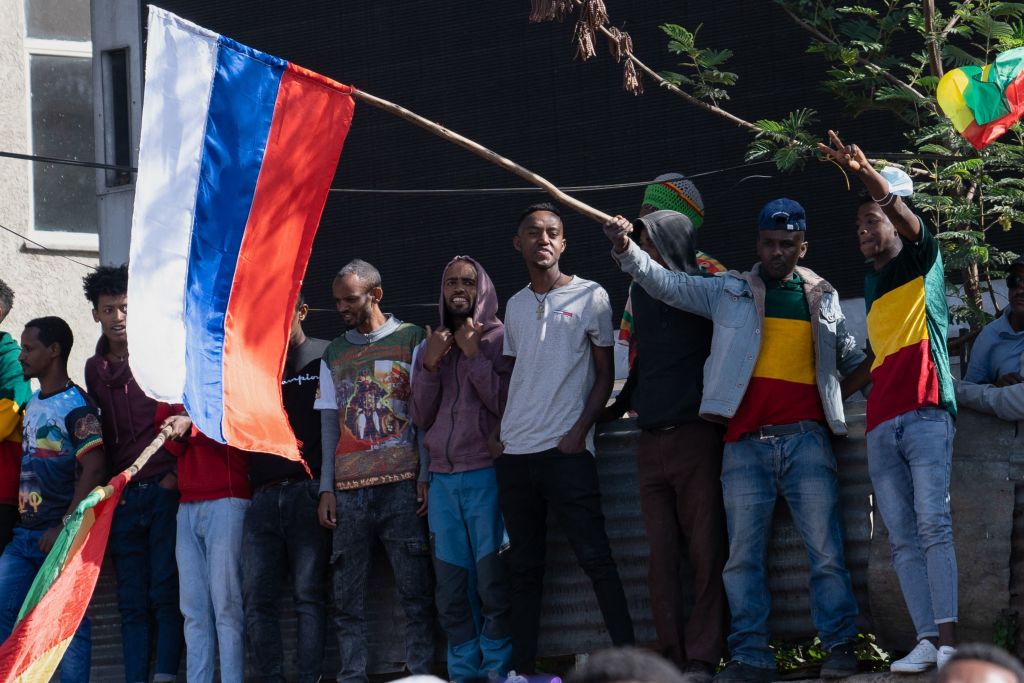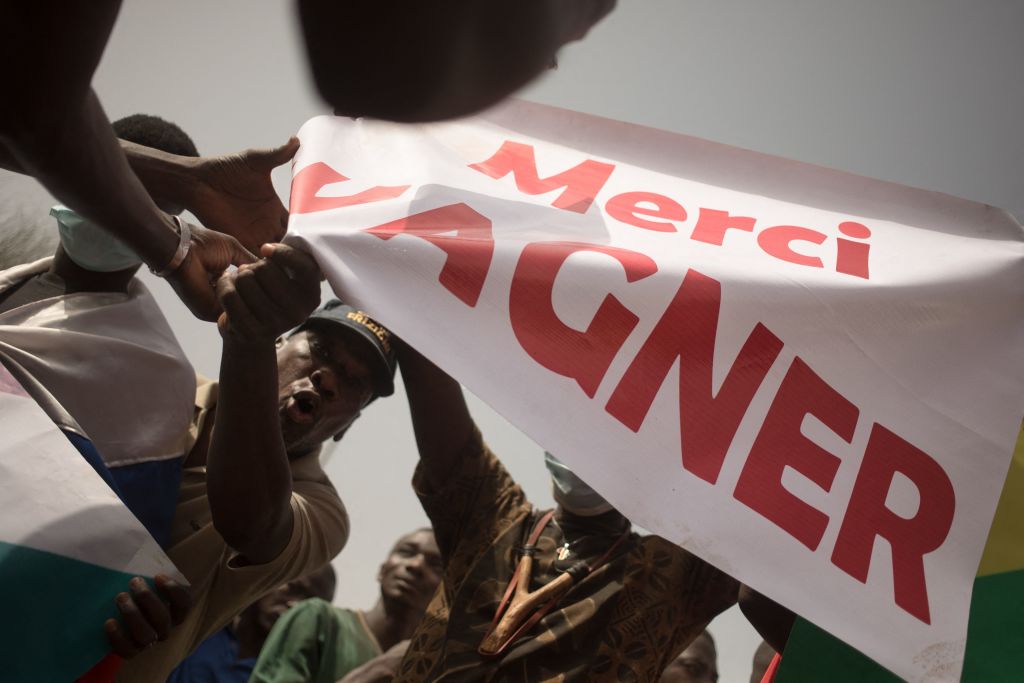
In 2018, contestants lined up in Bangui stadium to vie for the title of Miss Central African Republic (CAR). As they paraded, a new power on the regional stage was also doing its best to woo onlookers. With walls adorned in Russian flags, the Kremlin’s sponsoring of the CAR’s first beauty pageant in three years marked a showy bid by President Vladimir Putin to extend Russia’s soft power on the continent.
While the focus remains on Ukraine following Moscow’s invasion, Africa has, for some time, been a second front in Putin’s confrontation with the West and cannot be ignored. With 17 African nations abstaining, and 1 voting against, the Mar. 2 U.N. resolution condemning Russia’s war in Ukraine, the magnitude of Putin’s decade-long charm offensive is becoming plain. A new report from the Tony Blair Institute for Global Change shows how Russia is reviving Soviet-era ties with African states to extract resources from the region, and in exchange, become a security provider. Putin now appears to consider Africa an arena of his imperialist ambition, and hopes to lure the continent away from Western influence.
Africa is home to some of the fast-growing economies in the world and is abundant in natural resources. But the challenges faced by much of the continent—poverty, inflation, and deep-lying inequalities—are outpacing the abilities of many governments to service their populations, leading to instability. African leaders are pursuing various avenues of support, with Russia emerging as their new multipurpose ally.
Read More: The Growing Global Fallout From Russia’s War in Ukraine
It is a relationship based on paradox. Russia has a vested interest in the deployment of private military contractors (PMCs) in the region. Thus instead of bringing peace, it thrives on instability in African states and volatility among Africa’s leadership.
More from TIME
Since the invasion of Crimea in 2014, Russian PMCs have deployed to at least 19 African nations. One of them, the Wagner Group, has been tasked with operations that range from protecting commercial assets and fighting Islamist terrorists to the suppressing of anti-government uprisings. In Sudan, at least 500 Wagner men were deployed during 2017 to train the notorious Rapid Support Forces, and also to combat rebels who opposed President Omar al-Bashir. In Libya, Wagner provided military support to General Khalifa Haftar in his bid to oust the Western-backed U.N. Government of National Accord (GNA). Wagner also trained a mercenary rebel group that, last year, killed the Chadian president Idriss Deby.
PMC operations are linked to the extraction of natural resources. Following Wagner’s support for al-Bashir, gold mining licenses were awarded to a company reportedly linked to Russian oligarch Yevgeny Prigozhin, the alleged funder of the group. In a similar vein, the CAR awarded gold and diamond mining licenses to another of Prigozhin’s businesses, after Wagner was deployed to train its army and provide personal security to embattled President Faustin-Archange Touadéra. (Prigozhin has regularly denied any connection to Wagner.)

Russia’s threat to democracy in Africa
With the U.S. and French military draw-down in Africa, Russia is looking to prove itself as an alternative. Its deployment to Mali in December 2021 demonstrated the rapid support Moscow is able to offer struggling regimes. But Russia is also influencing from within. Since Putin’s embrace of the region in the last decade, political strategists have been sent to African governments, including those of the CAR and Madagascar, to counsel their leaders. The funding of pro-Russian television channels in Africa, electoral interference—even, indeed, the sponsoring of beauty pageants—are other methods to sway sentiment among Africans.
The receptiveness of some African leaders to Russian overtures is meanwhile a threat to liberal democratic reforms. The growing tendency to request PMC support for mounting security challenges, as Russian influence increases among African societies, is a clear indicator of a deepening authoritarian footprint on the continent.
Read More: China’s Embrace of Putin Is Looking More and More Costly
The West needs to take notice. China has long outpaced Western countries to become Africa’s biggest investor, while the presence of Western troops in conflict-affected countries has not been enough to ensure Africa’s peace and security. The region needs sustained support, militarily and economically. If the West cannot provide it, it will lose ground.
African abstentions from the U.N. vote to condemn Russian action in Ukraine shows that the West must not take its engagement with Africa for granted. Romanticizing democracy is not enough; thorough, long-term policy action and relationship-building with African states is a must. Just as Africa, and Russia, are re-evaluating their places on the world stage, now is the time for the West to renew its commitment to the continent. Pageants are not won by wallflowers.
More Must-Reads from TIME
- Cybersecurity Experts Are Sounding the Alarm on DOGE
- Meet the 2025 Women of the Year
- The Harsh Truth About Disability Inclusion
- Why Do More Young Adults Have Cancer?
- Colman Domingo Leads With Radical Love
- How to Get Better at Doing Things Alone
- Michelle Zauner Stares Down the Darkness
Contact us at letters@time.com